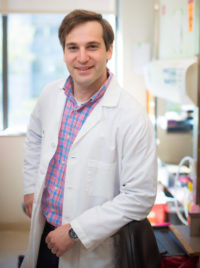Introducing 2021 ABOH Research Award Winner
Since the founding of the A Breath of Hope Lung Foundation (ABOH) in 2008, more than $2 million have been invested in U.S. scientific research directly related to the development of late-stage lung cancer therapies, as well as work tied to early detection of lung cancer. Today, we are pleased to announce the winner of this year’s $150,000 award – Dr. Kipp Weiskopf from the Whitehead Institute for Biomedical Research in Cambridge, Massachusetts.

Dr. Weiskopf’s research project funded by A Breath of Hope Lung Foundation focuses on the interaction between EGFR mutant lung cancer cells and the immune system. Although therapies that activate the immune system have been effective for some types of cancer, their use remains limited for EGFR mutant lung cancer. Prior studies have mainly focused on immunotherapies that target T cells and the PD-1/PD-L1 axis. In contrast, this project will investigate how immune cells called macrophages can be used to attack and eliminate EGFR mutant lung cancer cells. Macrophages are often the most common immune cells in tumors, and they can be provoked to attack cancer cells when provided with an appropriate stimulus. This study will investigate how macrophages can be activated to enhance conventional therapies for EGFR mutant lung cancer. The goal of this research is to provide the scientific rationale for testing these therapeutic strategies in patients with EGFR mutant lung cancer.
With our deepest gratitude, we thank the Peg Fisher-Jullie family and all who provide financial support to the ABOH Research Program. This is your win and you can be sure that your gifts are contributing to a five-year survival rate that is slowly but surely rising. ABOH is proud of the achievements of its funded investigators and plans to invest more fully in their leadership and success in the years ahead – thank you for your continued investment in our work.
ABOH Focuses on Early Detection AND Improved Treatments
One in 16 people will be diagnosed with lung cancer in their lifetime. Most will agree that prevention is important, but so is earlier detection, which can only be attained through expanded screening. The ongoing practice of allowing screening only for a small fraction of the people who will get lung cancer in their lifetime is a hurdle we must overcome.
Today’s lung cancer screening eligibility guidelines, while slowly improving, only include people over the age of 55 with a thirty-pack smoking history. As more and more young never-smokers and former smokers receive lung cancer diagnoses, our conversation needs to focus on three important subtopics:
Smoking is the number one cause of lung cancer, yet other causes, such as radon exposure and family history to name a few, must be considered more seriously as indicators of risk and criteria for screening.
Do not judge. The smoking habit is very difficult to overcome – a true addiction. Societal blame and the ongoing smoking stigma slow progress for all of us while adding stress and anxiety for patients, including nonsmokers with lung cancer.
Research focused on new treatments for the 70% of lung cancer patients diagnosed in stage 3 or 4 is imperative, but so is research focused on finding new tools to detect lung cancer earlier.
A Breath of Hope works for earlier detection…
A Breath of Hope Lung Foundation was honored to host a meeting in January for 80 healthcare professionals committed to saving lives through increased and improved lung cancer screening in the U.S. It was inspiring to hear these professionals dialogue with each other to better understand barriers to screening, as well as the solutions that have found success in other healthcare systems. A special thanks to our phenomenal presenters for their impact on national efforts to improve lung cancer survival rates.

